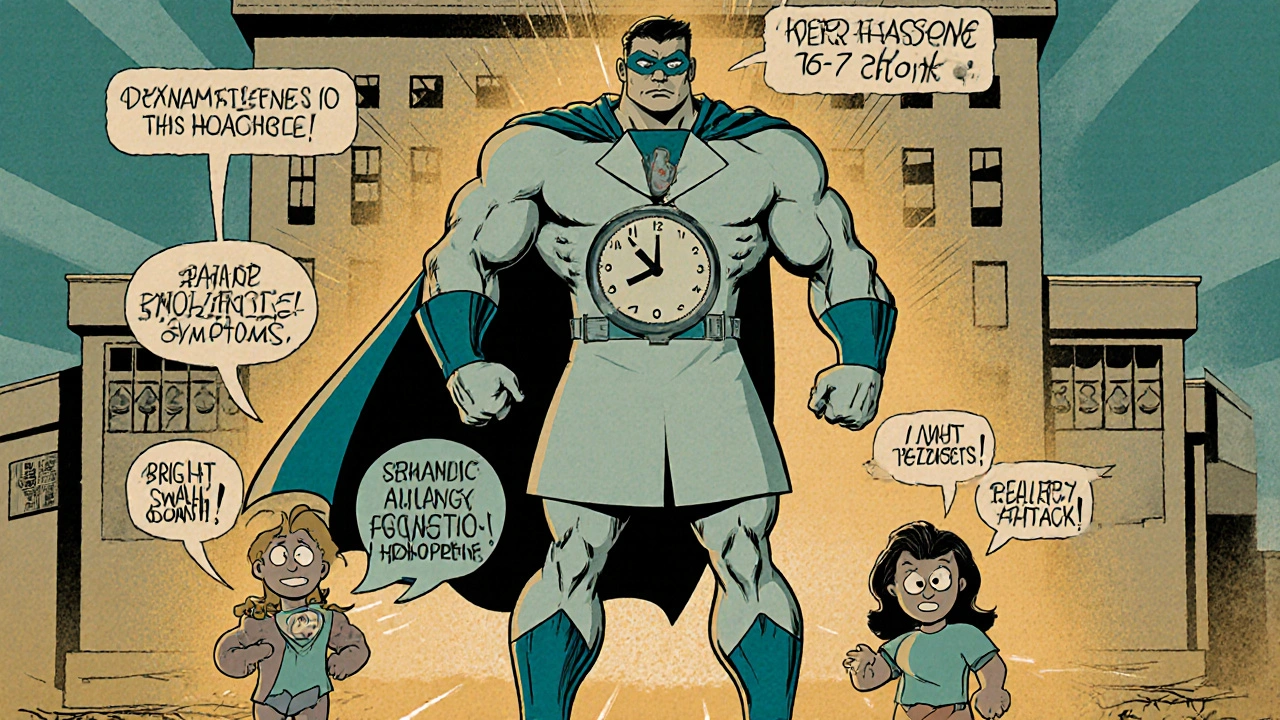Steroid Conversion Calculator
Convert Steroid Doses
This calculator helps determine equivalent doses between common corticosteroids based on potency comparisons from medical guidelines.
Results
Note: Dose conversions are approximate and based on standard potency ratios. Always consult your healthcare provider before changing steroid doses.
Decadron, the brand name for dexamethasone, is one of the most powerful corticosteroids used in medicine. It’s prescribed for everything from severe allergies and asthma flare-ups to brain swelling after injury, certain cancers, and even as part of COVID-19 treatment in hospitals. But it’s not the only option. Many people wonder: is there something safer, cheaper, or just as effective? Let’s break down how dexamethasone stacks up against its closest alternatives.
What Makes Dexamethasone Different?
Dexamethasone is a synthetic glucocorticoid. That means it mimics the body’s natural stress hormone, cortisol, but much stronger. It’s about 25 times more potent than hydrocortisone and has a long half-life-around 36 to 72 hours. That’s why a single daily dose often works, unlike prednisone, which usually needs to be taken multiple times a day.
It’s used in high doses for short bursts (like in adrenal insufficiency or severe allergic reactions) and in low doses for chronic conditions (like rheumatoid arthritis). Its strength is also why it’s used in hospitals for brain swelling: it crosses the blood-brain barrier better than most other steroids.
But that same strength brings risks. Long-term use can lead to weight gain, high blood sugar, bone loss, mood swings, and increased infection risk. That’s why doctors often look at alternatives-especially for people who need treatment for months or years.
Dexamethasone vs Prednisone: The Most Common Comparison
Prednisone is the most frequently prescribed steroid after dexamethasone. Many patients are switched from one to the other, especially when cost or availability becomes an issue.
Here’s how they compare:
| Feature | Dexamethasone | Prednisone |
|---|---|---|
| Relative Potency | 25x hydrocortisone | 4x hydrocortisone |
| Half-Life | 36-72 hours | 18-36 hours |
| Dosing Frequency | Once daily | Once or twice daily |
| Mineralocorticoid Activity | Very low | Moderate |
| Typical Starting Dose (Adult) | 0.75-9 mg/day | 5-60 mg/day |
| Cost (30-day supply, generic) | $10-$25 | $5-$20 |
| Best For | Short-term severe inflammation, brain swelling, cancer therapy | Chronic conditions like lupus, asthma, rheumatoid arthritis |
Prednisone is often preferred for long-term use because it’s slightly less potent, which can mean fewer side effects over time. It’s also more commonly used in outpatient settings. Dexamethasone, on the other hand, is favored in hospitals because of its long duration and strong anti-inflammatory punch.
One key difference: prednisone needs to be converted by the liver into its active form, prednisolone. That means people with liver disease may not get the full benefit. Dexamethasone doesn’t need this conversion-it works directly.
Other Alternatives: Methylprednisolone, Hydrocortisone, and Beyond
There are more options than just prednisone. Here are three others you might hear about:
- Methylprednisolone (Medrol): Similar to prednisone but slightly more potent. Often used in IV form for acute flare-ups, like in multiple sclerosis relapses or severe allergic reactions. It’s also used in "pulse therapy"-high doses over a few days. Side effects are similar to prednisone, but it’s rarely used for daily long-term treatment.
- Hydrocortisone: This is the closest to what your body naturally makes. It’s much weaker, so you need higher doses. It’s used for adrenal insufficiency, skin rashes, and mild allergic reactions. Not suitable for serious inflammation like brain swelling or severe asthma. But it’s the safest for kids and pregnant women when steroids are absolutely needed.
- Triamcinolone: Often used in injections for joint pain or inhaled for asthma. Less systemic absorption than dexamethasone, so fewer whole-body side effects. But it’s not used orally for systemic conditions like lupus or Crohn’s disease.
For many chronic conditions, doctors now try to avoid steroids altogether. Instead, they use disease-modifying drugs like methotrexate for rheumatoid arthritis or biologics like adalimumab for inflammatory bowel disease. These don’t suppress the entire immune system-they target specific pathways. That’s a big shift in modern medicine.
When Is Dexamethasone the Best Choice?
Dexamethasone shines in specific scenarios:
- Brain swelling: After a tumor, stroke, or head injury, dexamethasone reduces fluid buildup better than other steroids.
- Severe allergic reactions: In anaphylaxis or acute asthma attacks, its fast, strong action can be life-saving.
- Cancer treatment: Used to reduce nausea from chemo and to treat certain lymphomas and myelomas.
- COVID-19: In hospitalized patients needing oxygen, dexamethasone was shown in the RECOVERY trial to cut death risk by up to one-third in severe cases.
- Adrenal crisis: When the body can’t make enough cortisol, dexamethasone is preferred because it doesn’t interfere with diagnostic tests.
If you’re in one of these situations, dexamethasone is often the gold standard. But if you’re managing a chronic condition like eczema or arthritis, it’s rarely the first pick.
Side Effects: Which Alternative Is Safest?
All steroids carry risks. But the longer you take them, the more those risks add up.
Dexamethasone’s long half-life means it stays in your system longer. That can lead to more pronounced side effects like:
- High blood sugar (especially dangerous for diabetics)
- Bone thinning (osteoporosis)
- Fluid retention and high blood pressure
- Mood changes, anxiety, or insomnia
- Increased risk of infections
Prednisone and methylprednisolone have similar side effects, but because they’re shorter-acting, they’re sometimes easier to manage. Hydrocortisone has the mildest profile, but you’d need to take it multiple times a day and in much higher doses.
For older adults or people with diabetes, doctors often avoid dexamethasone unless absolutely necessary. In those cases, they might choose a lower-dose prednisone or try non-steroid options first.
Cost and Accessibility: What’s Affordable?
Generic dexamethasone is cheap-often under $20 for a 30-day supply. Prednisone is even cheaper, sometimes under $10. That’s why many insurers push patients toward prednisone unless there’s a clear clinical reason to use dexamethasone.
Insurance coverage can vary. Some plans require step therapy: you must try prednisone first before they’ll approve dexamethasone. If you’re paying out-of-pocket, dexamethasone isn’t a financial burden-but it’s not always the most practical choice.

What Should You Do?
If your doctor prescribes dexamethasone, ask:
- Why this drug and not another?
- Is this for a short-term fix or long-term use?
- Are there non-steroid options I should consider?
- What’s the plan for tapering off?
Never stop taking steroids suddenly. Your body can go into adrenal crisis if you do. Tapering down slowly under medical supervision is critical.
If you’re on long-term steroids, ask about bone density scans, blood sugar checks, and supplements like calcium and vitamin D. These can help reduce side effects.
Frequently Asked Questions
Is dexamethasone stronger than prednisone?
Yes, dexamethasone is about six times more potent than prednisone on a milligram-for-milligram basis. That means 0.75 mg of dexamethasone equals about 5 mg of prednisone. This higher potency makes it useful for acute, severe conditions, but it also increases the risk of side effects if used long-term.
Can I switch from dexamethasone to prednisone on my own?
No. Switching between steroids requires careful dose conversion and a tapering plan. Because they have different potencies and durations, switching without medical supervision can lead to withdrawal symptoms, adrenal insufficiency, or flare-ups of your condition. Always consult your doctor before changing medications.
Are there natural alternatives to dexamethasone?
There are no natural substances that replicate the powerful anti-inflammatory effect of dexamethasone. Some supplements like turmeric (curcumin) or omega-3s have mild anti-inflammatory properties, but they’re not substitutes for steroid treatment in serious conditions. Relying on them instead of prescribed steroids can be dangerous.
How long does dexamethasone stay in your system?
Dexamethasone has a half-life of 36 to 72 hours, meaning it takes about 3 to 5 days for most of it to leave your body. But its effects on your immune system and metabolism can last longer. That’s why even after you stop taking it, side effects like elevated blood sugar or mood changes can linger for days or weeks.
Is dexamethasone safe during pregnancy?
Dexamethasone crosses the placenta and can affect fetal development. It’s generally avoided in pregnancy unless absolutely necessary-like in cases of congenital adrenal hyperplasia or to help fetal lung development before preterm birth. Hydrocortisone is preferred for most pregnancy-related steroid needs because it’s less likely to affect the baby.
Next Steps: What to Do If You’re on Dexamethasone
If you’re currently taking dexamethasone:
- Keep track of any new symptoms-mood swings, blurry vision, swelling, or unusual fatigue.
- Ask your doctor about a plan to reduce your dose over time, even if you feel better.
- Get regular blood pressure and glucose checks if you’re on it for more than a few weeks.
- Don’t skip doses or stop suddenly. Talk to your doctor about tapering.
- Consider asking if a non-steroid treatment could replace it long-term.
For many, dexamethasone is a lifesaver. But it’s not a forever solution. The goal is always to use the lowest effective dose for the shortest time possible-and to explore alternatives when the situation allows.






Mike Laska
October 31, 2025 AT 07:47Keerthi Kumar
October 31, 2025 AT 09:25Adarsha Foundation
November 2, 2025 AT 07:05Dade Hughston
November 4, 2025 AT 06:00Jim Peddle
November 4, 2025 AT 06:08S Love
November 5, 2025 AT 17:22Pritesh Mehta
November 6, 2025 AT 20:13Billy Tiger
November 8, 2025 AT 03:04